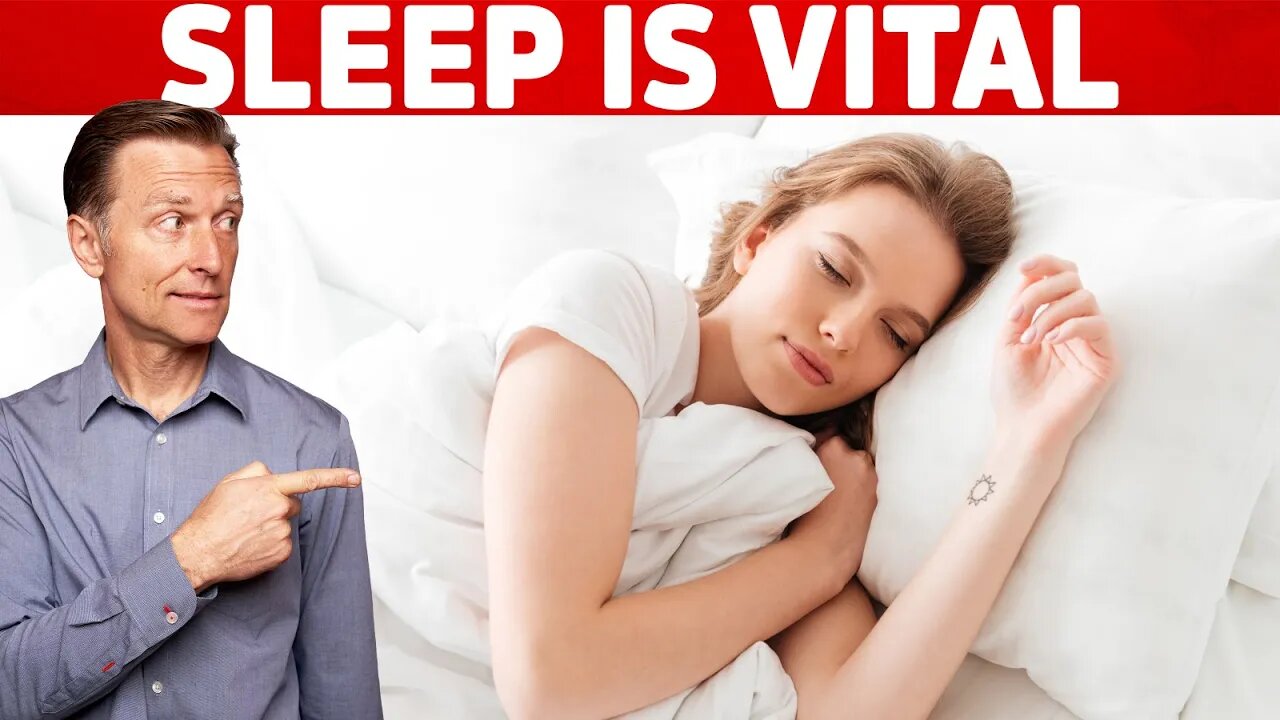Premium Only Content

Improving Sleep on the Ketogenic Diet / Intermittent Fasting Plan – Dr. Berg
I explain how to improve sleep when you’re on keto and intermittent fasting.
Timestamps:
0:00 How to improve sleep when you’re on keto and intermittent fasting
1:10 Here are some reasons why you might not be sleeping well
Sleep is vitally important when you’re on keto and intermittent fasting. Let’s find out how to improve sleep if you’re having challenges.
A lack of high-quality sleep could be the reason you’re not losing weight. Most of the hard-core fat-burning through the stimulation of growth hormone happens when you’re asleep. Also, fixing insulin resistance and blood sugar problems requires sleep. If you have diabetes, you probably notice that your blood sugars are way off on the days when you didn’t get a good night’s sleep.
Insomnia is a symptom of another problem; insomnia isn’t a disease. Let’s go through some reasons why you may not be getting high-quality sleep. The first is frequent eating. If you’re not doing intermittent fasting, and you eat snacks between meals, that will spike your insulin. You’ll be tired during the day but not be able to sleep at night. So, plus in intermittent fasting. Three meals per day, no snacks, then gradually move to two meals per day, no snacks.
Second, you may be getting up frequently to urinate. That’s a problem with insulin resistance. One of the symptoms of diabetes is frequent urination. Doing keto and intermittent fasting correctly will eventually correct the frequent urination. If you want to do a test to determine if you have a problem with insulin resistance, get a test called HOMA-IR.
Or you may have problems with your adrenals caused by accumulated stress in your body. Your body is in a constant state of flight or fight. I suggest a natural sleep aid and massage. If you’re consuming foods that cause you to bloat, such as cruciferous vegetables, that could disrupt your sleep. Start eating regular green lettuce instead, for example. Reduce the amount of cruciferous vegetables you consume, then gradually increase it.
Lastly, sleep apnea could be the culprit. It’s a problem of too much insulin. Keto and intermittent fasting will eventually correct it and help improve your sleep.
Now you know how to improve sleep when you’re on keto and intermittent fasting.
Dr. Eric Berg DC Bio:
Dr. Berg, age 56, is a chiropractor who specializes in Healthy Ketosis & Intermittent Fasting. He is the author of the best-selling book The Healthy Keto Plan, and is the Director of Dr. Berg Nutritionals. He no longer practices, but focuses on health education through social media.
Follow us on FACEBOOK: fb.me/DrEricBerg
Send a Message to his team: m.me/DrEricBerg
ABOUT DR. BERG: https://bit.ly/39LCWg8
Disclaimer: Dr. Eric Berg received his Doctor of Chiropractic degree from Palmer College of Chiropractic in 1988. His use of “doctor” or “Dr.” in relation to himself solely refers to that degree. Dr. Berg is a licensed chiropractor in Virginia, California, and Louisiana, but he no longer practices chiropractic in any state and does not see patients so he can focus on educating people as a full-time activity, yet he maintains an active license. This video is for general informational purposes only. It should not be used to self-diagnose and it is not a substitute for a medical exam, cure, treatment, diagnosis, and prescription or recommendation. It does not create a doctor-patient relationship between Dr. Berg and you. You should not make any change in your health regimen or diet before first consulting a physician and obtaining a medical exam, diagnosis, and recommendation. Always seek the advice of a physician or other qualified health provider with any questions you may have regarding a medical condition.
Thanks for watching!
You can see how simple it is to improve sleep when you’re on keto and intermittent fasting.
-
 10:44
10:44
Dr. Eric Berg
8 days agoThis Ingredient Is KILLING Your Dog...
7.72K32 -
 3:55:56
3:55:56
Due Dissidence
13 hours agoSchmuley TRASHES Shapiro, Maxwell Sings For Pardon, Uhuru Doc Preview - Live From St. Louis!
33.8K38 -
 LIVE
LIVE
Lofi Girl
2 years agolofi hip hop radio 📚 - beats to relax/study to
385 watching -
 2:23:21
2:23:21
PandaSub2000
5 days agoMadison VR (Part 4) | PSVR 2000 (Original Live Version)
14.4K2 -
 2:34:32
2:34:32
Badlands Media
5 days agoCODEX 9/11
284K249 -
 1:53:43
1:53:43
Nerdrotic
8 hours ago $0.30 earnedMysteries of 3I/ATLAS | Forbidden Frontier #113
47K5 -
 2:04:21
2:04:21
vivafrei
1 day agoEp. 278: D.C. Peace Wave! Big Tish & Nipple Judge SPANKED! "Maryland Man" Trafficker FREE & MORE?
101K127 -
 3:02:42
3:02:42
Damysus Gaming
4 hours agoBorderlands 3 - Part 8 - FL4K Time | Children of the Vault be Warned!
17.5K -
 1:30:28
1:30:28
Patriots With Grit
7 hours agoWhat You Should Know About Harmful Vaccine Ingredients And What To Say To Your Doctor, Pediatrician, Health Department or School When They Pressure You, Your Kids Or Your Family Members | Dr. Bryan Ardis, D.C.
15.5K8 -
 2:21:12
2:21:12
This is the Ray Gaming
3 hours ago $0.03 earnedSunday Night Live with the Boys | Rumble Premium Creator
8.64K